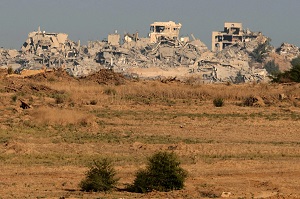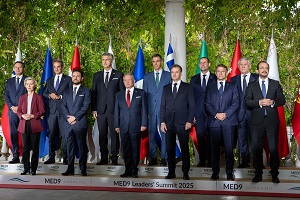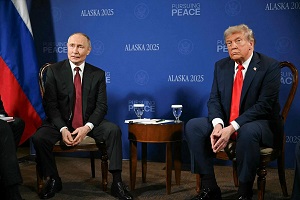Poor Syria - By James J. Zogby, The Jordan Times
Poor Syria! That’s an inauspicious but honest start, as Syria faces myriad problems, internal and external, without easy resolutions.
Syria has long been a victim of others’ machinations— from Ottoman rule to the French and British carving of the Arab East to satisfy imperial designs. With poor governance and sectarian rifts, like its “other half” (Lebanon), Syria became a playground for the deadly games of neighbors and others.
In recent years, Israel, Iran, Turkey, Russia, the US, Arab donors to Muslim groups, Lebanese and Palestinian factions and militias, Kurds, and ISIS meddled in Syria, militarily and politically. Like reckless kids playing a dangerous game, these “outsiders” paid no attention to the consequences.
When Syria’s war on itself began in 2011, dire warnings about its likely outcomes were ignored. As the death toll rose along with calls in the US and the Arab World to arm the Syrian opposition, others cautioned that more weapons for the regime’s opponents would only increase the weapons provided by Assad’s allies. The spiral continued, until the country was drenched in blood and fractured.
Then, after 13 years of conflict, the group once associated with al Qaeda, that had long controlled the northern Syrian province of Idlib, marched into Damascus toppling the Assad regime, after its Russian and Iranian backers’ abandonment.
Many in Syria and around the world celebrated despite the grim reality: more than a half million dead, Syria’s infrastructure largely destroyed, more than half its population in exile or internally displaced, and Syria’s fragile social and political cohesion shattered.
Once installed in Damascus, the group formerly deemed a terrorist organization has put on suits and moderated their speech to present themselves as responsible stewards of the “new Syria.” But the challenges they face may be insurmountable. While they control Damascus, the rest of the country remains fractured. With Iran and its allied militias gone or weakened, and Russia consolidated along the coast to protect its Mediterranean port and airbase, Israel and Turkey have dug in deeper. Israel’s been especially aggressive in seizing land, aggravating sectarian strife, and bombing Syria’s defense and internal security capabilities. Syria’s diverse ethnic and sectarian communities remain uncomfortable with the new regime’s past and distrust their purported change. Signs indicate that the new government doesn’t have full control of some armed militias that fought alongside them during the long war.
Early on, the new rulers made predictable mistakes. Instead of reassuring the civil service, military, and police forces that worked under Assad, tens of thousands were dismissed. Some of these resentful newly unemployed retain their weapons and may spark future unrest.
Despite the new regime’s promising rhetoric, they face seemingly impossible choices, constraining their ability to move forward. If the stress becomes too great, they may “circle the wagons” and take increasingly repressive measures to avoid losing power.
One example: The new regime faces enormous financial pressures to rebuild the country, grow its economy, reconstitute and pay its police and civil service employees. But raising funds and securing foreign investments are hampered because the Assad government was under international sanctions and the new government remains “a terrorist organization” according to the UN’s Security Council. While requiring demonstrations that it’s rejected extremism is justifiable, delays in support also delays Syria’s rebuilding, restarting needed services, and providing salaries to public servants. The US’s hesitation in sanctions relief is driven in part by a desire for Syrians to enter a security arrangement with Israel. But such an arrangement would exacerbate domestic tensions.
The bottom line: A problem’s resolution can’t rest on a requirement that the parties lack the capacity for or have no interest in.
Syria’s new government may have ruled Idlib and overthrown the old regime, but questions remain about their capacity for creating national unity and governing the more complex Syrian polity. Israel, Turkey, Iran and others need to leave Syria and stop exploiting sectarian tensions for their own ends, but they have no interest in doing so.
If there were ever a situation where the world needed a strong and effective United Nations, this is it. Absent a neutral mechanism to assist in the resolution of conflicts and the enforcement of the rule of law, Syria, its people, and its new rulers are left to their own devices and the whim of malign regional forces. Poor Syria!
Dr. James J. Zogby — President — Arab American Institut
Latest News
-
 'Come back quick': Supporters cheer Sarkozy as French ex-leader goes to jail
'Come back quick': Supporters cheer Sarkozy as French ex-leader goes to jail
-
 Trump says MidEast allies ready to 'straighten out Hamas' if asked
Trump says MidEast allies ready to 'straighten out Hamas' if asked
-
 Britain deploys troops to 'Israel' to monitor Gaza ceasefire
Britain deploys troops to 'Israel' to monitor Gaza ceasefire
-
 King attends MED9 Summit, calls for joint action to ensure commitment to Gaza agreement
King attends MED9 Summit, calls for joint action to ensure commitment to Gaza agreement
-
 Lavrov and Rubio discuss Putin-Trump summit, Zelensky seeks invite
Lavrov and Rubio discuss Putin-Trump summit, Zelensky seeks invite